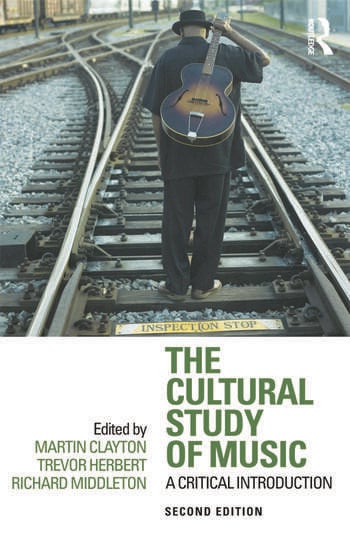
音楽の文化研究
The
Cultural Study of Music, and/or Music as Cultural System

☆2003 年初版、2012年に改訂版がでた『音楽の文化研究:批判的イントロダクション』であるが、各論文の表題をみるかぎり、音楽を題材にするカルスタ(英語のオリジナルタイトルは単数形の「文化研究」)は、まさ に、なんでもありの研究のようだ。カルチュラルスタディーズ︎▶︎ラップ音楽▶︎︎音楽 美学批判▶︎音楽と政治▶︎︎音楽とナショナリズム▶レゲトン大百科︎▶︎︎マーク・フィッシャー▶︎音楽の合理的および社会的基盤▶︎︎ヌエバ・カンシオン▶︎民俗音楽・フォークミュージック▶︎︎音楽人類学・民族音楽学▶セリア・クルスと東西冷戦︎▶︎︎ヒップホップの社会的課題▶ラップ音楽︎▶政治の美学化︎︎▶ラップは本当にわるいのか?︎▶︎︎▶︎▶︎︎▶︎▶︎
★
別名クレジット「音楽のカルチュラルスタディーズ」
| ★What is the
relationship between music and culture? The first edition of The
Cultural Study of Music: A Critical Introduction explored this question
with groundbreaking rigor and breadth. Now this second edition refines
that original analysis while examining the ways the field has developed
in the years since the book’s initial publication. Including
contributions from scholars of music, cultural studies, anthropology,
sociology, and psychology, this anthology provides a comprehensive
introduction to the study of music and culture. It includes both
pioneering theoretical essays and exhaustively researched case studies
on particular issues in world musics. For the second edition, the
original essays have been revised and nine new chapters have been
added, covering themes such as race, religion, geography, technology,
and the politics of music. With an even broader scope and a larger
roster of world-renowned contributors, The Cultural Study of Music is
certain to remain a canonical text in the field of cultural musicology. |
『音楽と文化の関係とは?音楽の文化研究』の初版は、この問いを画期的
な厳密さと広範さで探求した: A Critical
Introduction』は、この問いを画期的な厳密さと広さで探求した。この第2版では、初版の出版から数年の間にこの分野がどのように発展してきた
かを検証しながら、当初の分析に磨きをかけている。音楽、カルチュラル・スタディーズ、人類学、社会学、心理学の研究者による寄稿を含むこのアンソロジー
は、音楽と文化の研究に包括的な入門書を提供する。先駆的な理論的エッセイと、世界の音楽における特定の問題について徹底的に研究されたケーススタディの
両方が収録されている。第2版では、オリジナルのエッセイを改訂し、新たに9つの章を加え、人種、宗教、地理、テクノロジー、音楽の政治といったテーマを
取り上げている。より広範な範囲をカバーし、世界的に著名な寄稿者が加わった『The Cultural Study of
Music』は、文化音楽学の分野における正統的なテキストであり続けることは間違いない。 |
| Introduction: Music Studies
and the Idea of Culture Richard Middleton Part 1: When? Musical Histories 1. Music and Biocultural Evolution Ian Cross 2. Music and Culture: Historiographies of Disjuncture, Ethnographies of Displacement Philip V. Bohlman 3. Historical Musicology: Is It Still Possible? Rob C. Wegman 4. Social History and Music History Trevor Herbert 5. Musicology, Anthropology, History Gary Tomlinson Part 2: Where? Locations of Music 6. Textual Analysis or Thick Description? Jeff Todd Titon 7. Comparing Music, Comparing Musicology Martin Clayton 8. The Destiny of “Diaspora” in Ethnomusicology Mark Slobin 9. Globalization and the Politics of World Music Martin Stokes 10. Contesting Difference: A Critique of Africanist Ethnomusicology Kofi Agawu 11. What a Difference a Name Makes: Two Instances of African-American Popular Music David Brackett 12. Music, Space, and Place: The Geography of Music Adam Krims 13. Music and Everyday Life Simon Frith Part 3: How? Processes, Practices, and Institutions of Music 14. Music, Culture, and Creativity Jason Toynbee 15. Musical Autonomy Revisited David Clarke 16. Music as Performance Nick Cook 17. The Cultural Study of Musical Instruments Kevin Dawe 18. Music Education, Cultural Capital, and Social Group Identity Lucy Green 19. Music Technology, or Technologies of Music? Bennett Hogg 20. Music and Material Culture Will Straw Part 4: Whose? Social Forces and Musical Belongings 21. Music and Social Categories John Shepherd 22. Music and Mediation: Toward a New Sociology of Music Antoine Hennion 23. Music and the Social Georgina Born 24. Locating the People: Music and the Popular Richard Middleton 25. Music and the Market: The Economics of Music in the Modern World Dave Laing 26. Music, Sound, and Religion Jeffers Engelhardt 27. Music, Race, and the Fields of Public Culture Ronald Radano 28. Music, Gender, and Sexuality Fred E. Maus Part 5: Who? Musical subjectivities 29. What’s Going On: Music, Psychology, and Ecological Theory Eric F. Clarke 30. Musical Materials, Perception, and Listening Nicola Dibben 31. Music, Experience, and the Anthropology of Emotion Ruth Finnegan 32. Towards a Political Aesthetics of Music David Hesmondhalgh 33. Music and the Subject: Three Takes John Mowitt 34. Of Mice and Dogs: Music, Gender, and Sexuality at the Long Fin de Siècle Ian Biddle 35. Subjectivity Unbound: Music, Language, Culture Lawrence Kramer |
 【初版の執筆陣:訳本】 【初版の執筆陣:訳本】音楽研究と文化の思想 / リチャード・ミドルトン著 音楽と生物文化的進化 / イアン・クロス著 音楽学、人類学、歴史 / ゲイリー・トムリンソン著 音楽と文化 : 断絶のヒストリオグラフィ / フィリップ・V.ボールマン著 音楽の比較、音楽学の比較 / マーティン・クレイトン著 音楽と社会的カテゴリー / ジョン・シェファード著 音楽とその媒体 : 新しい音楽社会学に向けて / アントワーヌ・エニョン著 音楽と日常生活 / サイモン・フリス著 音楽・文化・創造性 / ジェイソン・トインビー著 音楽と心理学 / エリック・F.クラーク著 主観礼賛!音楽・解釈学・歴史 / ローレンス・クレイマー著 歴史音楽学はまだ可能か? / ロブ・C.ウェグマン著 社会史と音楽史 / トレヴァー・ハーバート著 音楽の自律性再考 / デイヴィッド・クラーク著 テクスト分析か、厚い記述か? / ジェフ・トッド・ティトン著 音楽、体験、そして情動の人類学 / ルース・フィネガン著 音楽の素材、知覚、聴取 / ニコラ・ディベン著 パフォーマンスとしての音楽 / ニコラス・クック著 ネズミと犬について : 世紀末における音楽、ジェンダー、セクシュアリティ / イアン・ビドゥル著 差異を糾弾する : アフリカ民族音楽研究批判 / コフィ・アガウ著 名称がもたらす差異 : アフリカン-アメリカン・ポピュラー音楽にかんする2つの事例 / デイヴィッド・ブラケット著 人々とは誰か? : 音楽とポピュラーなるもの / リチャード・ミドルトン著 音楽教育、文化資本、社会集団のアイデンティティ / ルーシー・グリーン著 楽器のカルチュラル・スタディー / ケヴィン・ダウ著 民族音楽学における「ディアスポラ」の運命 / マーク・スロウビン著 グローバリゼーションと世界音楽の政治学 / マーティン・ストウクス著 音楽と市場 : 現代世界の音楽経済学 / デイヴ・レイン著 |
| ☆民族音楽学を含めて、ポピュラー音楽の研究と研究者の流れはいちおう以下のよ
うになる。 1)アラン・メリアム、ジョン・ブラッキング、スティーヴン・フェルド 2)文化社会学(ハワード・ベッカー、アントワーヌ・エニョン、ティア・デノーラ) 3)カルチャル・スタディーズ(フリス、ヘブディッジ、タグ) 4)批判的音楽学(ジョゼフ・カーマン、マクレアリ、トムリンソン、クレイマー) (ミドルトン 2011:2) |
|
| Musiksoziologie Aus Webers später Werkphase stammt die musiksoziologische Schrift Die rationalen und soziologischen Grundlagen der Musik. Vermutlich in einem Zeitraum ab 1910 geschrieben, wurde sie als unabgeschlossene Arbeit aus dem Nachlass erstmals 1921 als eigenständige Publikation veröffentlicht. Ihre Abfassung erfolgte in einer Werkphase, als sich Weber intensiv für eine „Soziologie der Cultur-Inhalte“ interessierte.[241] In diesen Jahren führte er lange Gespräche mit dem jungen Georg Lukács über die erlösende Kraft der Kunst.[242] Biographisch sensibilisierte ihn für die Musik zudem seine intime Freundschaft mit der Pianistin Mina Tobler.[243] Bemerkenswert und für Weber erregend war die Entdeckung, dass sogar die Musik Teil des okzidentalen Rationalisierungsprozesses war, was ihn zu der Schlussfolgerung führte, dass „die rationale harmonische Musik ebenso wie den bürgerlichen Betriebskapitalismus […] nur die okzidentale Kultur hervorgebracht“ hat.[244] Walther Müller-Jentsch vermutet mit Dirk Kaesler indessen, dass es sich hier um unterschiedliche Rationalitätsbegriffe handelt.[245] Steffen Sigmund wertet die Schrift als „Gründungsdokument der (deutschen) Musiksoziologie“,[246] Für Theodor W. Adorno ist sie der „bislang umfassendste und anspruchsvollste Entwurf einer Musiksoziologie“.[247] |
音楽社会学(→マッ
クス・ヴェーバー) ヴェーバーの社会学的著作『音楽の合理的および社会学的基礎(Die rationalen und soziologischen Grundlagen der Musik)』は、彼の研究の後期の段階に属するものである。1910年以降に書かれたと思われるこの作品は、1921年に初めてウェーバーの遺品から未 完成のまま出版された。それは、ヴェーバーが「文化的内容の社会学」に強い関心を抱いていた時期に書かれた[241]。この時期、彼は芸術の救済力につい て若いゲオルグ・ルカーチと長く会話していた[242]。生物学的に、ピアニストのミナ・トブラーとの親しい友情も彼を音楽に感化していた[243]。 ヴェーバーにとって驚くべき、そして刺激的なことは、音楽でさえも西洋の合理化プロセスの一部であるという発見であり、彼は「合理的な調和音楽は、ブル ジョア産業資本主義のように[中略]西洋の文化のみが生み出した」という結論に至った。 [244] 一方、Walther Müller-Jentschは、Dirk Kaeslerとともに、ここでは合理性の異なる概念を扱っているのではないかと疑っている[245] Steffen Sigmundはこの著作を「(ドイツの)音楽社会学の創設文書」であると評価し[246] Theodor W. Adornoにとっては「これまでの音楽社会学の最も包括的かつ意欲的なドラフト」である[247]と評している。 |
リ ンク
文 献
そ の他の情報
Copyleft, CC, Mitzub'ixi Quq Chi'j, 1996-2099